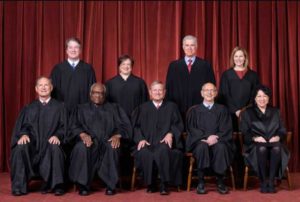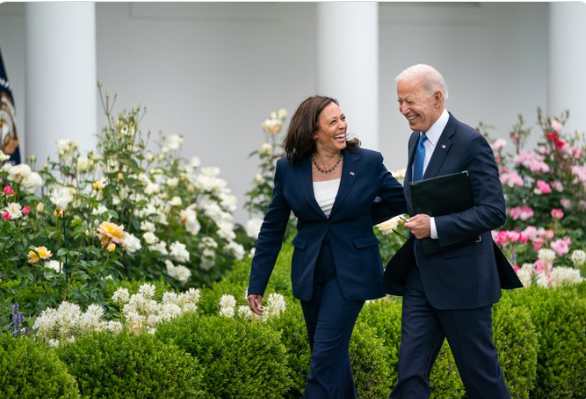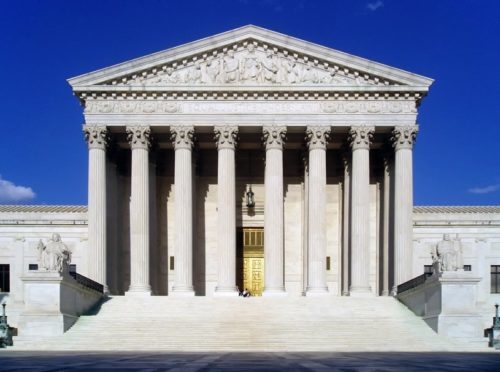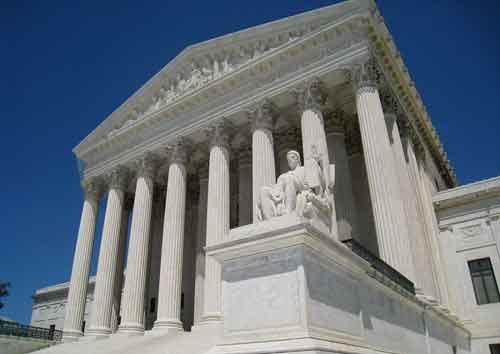“The TERM Act is necessary because lifetime tenure on the United States Supreme Court leads to a court that is insulated from, and unaccountable to, the American people,” said Rep. Hank Johnson, the bill’s sponsor.

As the U.S. Supreme Court prepares to weigh in on presidential immunity and other major issues in the months ahead, more than 50 advocacy groups on Tuesday endorsed legislation that would create 18-year terms for current and future justices and provide two appointments for each presidential term.
“Extremists on the Supreme Court have undermined our democracy and fundamental freedoms by gutting voting rights, opening the floodgates to unlimited corporate money in our elections, and reversing 50 years of precedent by overturning Roe v. Wade,” said Stand Up America executive director Christina Harvey in a statement.
“No one deserves power for life,” she argued. “That’s why 49 out of 50 states have either term limits, elections, or age limits for their highest courts. To protect our democracy and our fundamental freedoms, Congress should enact term limits for the U.S. Supreme Court.”
“To protect our democracy and our fundamental freedoms, Congress should enact term limits for the U.S. Supreme Court.”
Along with Stand Up, organizations calling on Congress to pass the Supreme Court Tenure Establishment and Retirement Modernization (TERM) Act include Accountable.US, Alliance for Justice, Brennan Center for Justice, Color of Change, Center for Popular Democracy, Citizens for Responsibility and Ethics in Washington, Demand Justice, Greenpeace USA, Indivisible, March for Our Lives, MoveOn, NextGen America, People for the American Way, Public Citizen, and Working Families Party.
The TERM Act (H.R. 5566) is led by Congressman Hank Johnson (D-Ga.), who reintroduced the bill in September and said during an event outside the Supreme Court that “our system is broken, and Congress must act if we are to save freedom, liberty, and democracy for all.”
Noting that the bill is part of a reform package that includes the Judiciary Act and the Supreme Court Ethics, Recusal, and Transparency Act, Johnson argued that “the TERM Act is necessary because lifetime tenure on the United States Supreme Court leads to a court that is insulated from, and unaccountable to, the American people, which is bad for democracy.”
As Johnson’s office detailed at the time, along with establishing term limits and the new appointment schedule, the bill would:
Require current justices to assume senior status in order of length of service on the court as regularly appointed justices receive their commissions;
Preserve life tenure by ensuring that senior justices retired from regular active service continue to hold the office of Supreme Court justice, including official duties and compensation; and
Require a randomly selected senior status Supreme Court justice to fill in on the court if the number of justices in regular active service falls below nine.
The legislation now has 28 co-sponsors—including key House leaders: Congressional Progressive Caucus Chair Pramila Jayapal (D-Wash.), Rules Committee Ranking Member Jim McGovern (D-Mass.), Judiciary Committee Ranking Member Jerry Nadler (D-N.Y.), and Oversight Committee Ranking Member Jamie Raskin (D-Md.).
Since former GOP President Donald Trump worked with Senate Republicans to create a right-wing supermajority on the country’s highest court by appointing Justices Neil Gorsuch, Brett Kavanaugh, and Amy Coney Barrett, people and advocacy groups across the country have been increasingly demanding reforms.
Those calls have been bolstered by revelations about multiple justices’ relationships with ultrawealthy individuals and the Supreme Court’s November response to mounting concerns: a nonbinding code of conduct that critics decried as a “toothless PR stunt.”
In contrast with his predecessor, Democratic President Joe Biden has so far only appointed one member of the court: Justice Ketanji Brown Jackson—who in 2022 replaced a retiring liberal, keeping in place the 6-3 ideological split.
After beating Trump in 2020, Biden is set to face him again in the November presidential election, thanks in part to the Supreme Court’s 9-0 ruling last month that states can’t remove federal candidates from their ballots—as Colorado had, determining that the former president was constitutionally ineligible to return to elected office because he had engaged in insurrection.
The court is set to hear arguments in another Trump-related case later this month. The Republican is trying to dodge federal charges for interfering with the 2020 election—one of his four ongoing criminal cases—by claiming presidential immunity. In amicus briefs submitted Monday, advocacy groups, business leaders, constitutional scholars, former government and military officials, historians, and national security professionals warned that a finding in Trump’s favor would endanger U.S. democracy.
The three Trump appointees have not recused themselves from the cases; neither has Justice Clarence Thomas, whose activist wife Ginni Thomas was involved in right-wing efforts to block certification of Biden’s win.
Common Dream’s work is licensed under a Creative Commons Attribution-Share Alike 3.0 License. Feel free to republish and share widely.
[content id=”79272″]







